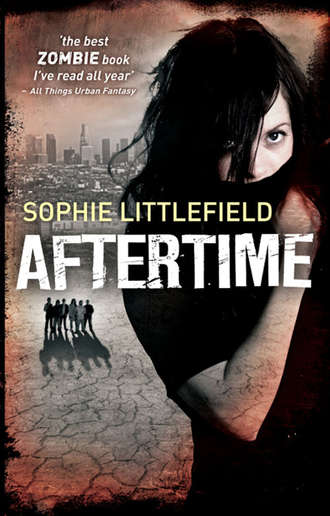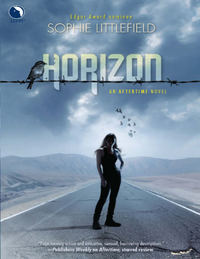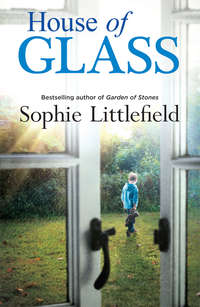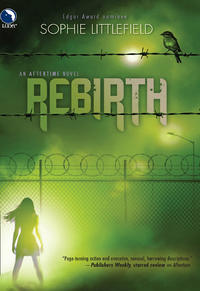
Полная версия
Aftertime
“I don’t know if she’s all right,” she said after a while, keeping her eyes closed.
She could feel Smoke nod as he held her a little tighter, his arms drawing her closer against him. “I know,” he whispered. “But we try anyway. Right? We try anyway.”
After a while longer Cass pulled away, embarrassed, blinking away the threat of tears. She did not cry easily, not anymore, so what was happening to her? Was it the women at the bath, the illusion of friendship, was she so hungry for human contact that she had let her guard down so easily?
She didn’t look at Smoke, but when they started walking again he stayed by her side. She knew that earlier he’d walked ahead to shield her from whatever they might come up against in the dark. Now she had lost that advantage. But it had been an illusory advantage at best; anything that threatened Smoke threatened her, as well.
The moon was three-quarters full and its watery light was sufficient to mark their way along the road. The smell of tar, cooling now after a day softening in the late-summer sun, mixed with the gingery kaysev and the dry dirt smell of deadwood. Far off in the distance she heard a cricket, and then another, a lonely duet. There were crackling sounds in the brush now and then. Jackrabbits and quail and snakes.
For a while, after the country’s livestock had fallen to the waves of bioterror attacks, there was panic that wild animals would be hunted to extinction. At first, people worried that the pathogens killing the cattle and sheep and chickens and pigs and trout and salmon would spread to the wild—and themselves, of course—but advances made early in the second decade of the century tailored chemicals to species with astonishing specificity, allowed them to be precisely targeted, too. The agriculture industry refined their acute toxins to target specific and narrow bandwidths of pests and rodents; in the wrong hands, it was a simple enough exercise to use the same techniques on other species. Only the attacks on fowl went wide, taking out many bird species until it was a rarity to see even a common blue jay or sparrow. Terrorists killed off other food-source species with laserlike precision, and those who ate the infected meat, of course. It didn’t take long until no one ate any farmed meat at all.
That’s when everyone became a hunter. Traps and slingshots were cobbled together; the many who refused to surrender their guns in the early days of the riots put them into service. Cats and dogs disappeared first, and then rabbits and pigeons and rodents. In one surreal episode, a grassroots environmental group pasted up posters of the common brown rat all over Silva, predicting its extinction and urging people to search out vegetarian proteins.
But things had worked themselves out, hadn’t they? Now there weren’t enough humans left to prevent the poisoned and overhunted species from coming back. Why not? Surviving creatures seemed more than content to graze on the kaysev. And on each other, in the case of the carnivores. Their populations burgeoned, even thrived Aftertime.
Cass herself had come upon a nest of baby rabbits a couple of nights ago. The mother stared at her with eyes wide and yellow in the moonlight, and its heartbeat had felt impossibly fast when Cass put her hands around its soft throat.
But after a moment Cass stopped squeezing and backed away, the rabbit quivering with fear, but alive. Without tools, without fire, it would have been difficult to eat the rabbit anyway.
And it wasn’t necessary. A diet of kaysev truly was adequate. Cass never felt full; in the language of Before she might have said that she never felt satisfied—but satisfaction was an elusive and outdated concept. Serenity—contentment—they seemed as unlikely for citizens as the ability to fly or read minds.
But what of the women, laughing together at the baths? What of the easy banter, the sly teasing, the gentle humor? Weren’t these a sign of—if not happiness—then at least ease of mind? Had the time that passed while Cass was gone been enough to heal the survivors, the denizens of this land? To make them forget, or at least accept, the worst of the horrors, and search out things worth living for?
At the library the mood had been bleak. Loss and devastation and grief pervaded every room, every corner, every conversation. There had been talk—endless talk—but it was the talk of fear and relief and guilt and desperation, a constant discussion of odds and measures and likelihoods, as though such talk could keep them safer, could keep the churning threats at bay.
Time had passed—two months—since Cass was taken. In two months the people sheltering together at the school had become a real community, built on cooperation and friendship. And love, or at least lovemaking. Cass thought about the look that had passed between Smoke and Nora.
“Did she mind?” she asked abruptly. “You coming with me. Did Nora mind?”
Smoke said nothing for a moment, and Cass wondered if it was something she had no right to ask. Smoke had offered to accompany her, nothing more.
“Yes,” he finally said. “She minded very much.”
“But you came anyway.” A question more than a statement.
“Yes, I came anyway. And I understand that you want to know why. But I’m not sure I can tell you. I mean, I know what answers I ought to give—that it gives my life some meaning to be able to help you. Or that in Aftertime we have to think of the greater good, not the needs of individuals. Or even that we have so little of our humanity left that we need to take every opportunity we can to remind ourselves that we aren’t savages.”
“Those all work for me,” Cass said after a moment, trying to let him know that he was off the hook, that he didn’t owe her an answer.
“Well, thanks. But the truth is … I don’t love her. Nora. And maybe this was a convenient way to leave. I don’t know … I just don’t know.”
“I’m sorry. I shouldn’t have pried.”
“Yeah, well … some people say I think too much. They used to say it, anyway. Now …” Smoke trailed off, and they walked in silence.
He was the sort of man who went to places other people couldn’t follow, and it made her want to know more. “What did you do before? If it’s okay for me to ask.”
“Sure. Look, Cass—” he glanced at her, eyes flashing in the moonlight “—let’s get this straight, okay, seeing as neither of us knows what’s coming tonight or tomorrow or next week or next month. You can ask me anything you want. If I don’t want to tell you, I won’t. But I don’t see where some sort of notion of, of, I don’t know, propriety or whatever is going to help any of us now. And talking might help.”
Might help what? Cass wondered—help to pass the time, or keep her mind off the dangers and worries, or make her forget who and what she was and how she’d got that way? But she didn’t ask for clarity. “Deal,” she said.
“Okay, so … I was an executive coach.”
“A what?”
“I helped people figure out what was holding them back in the professional workplace.” Smoke’s voice carried some dark emotion. Regret, maybe. “And then I showed them how to change.”
“So you basically told other people how to do their jobs? And got paid for it?”
Smoke laughed bitterly. “I guess that’s one way to sum it up. On paper, my job was to guide people to be more effective in their work through an exploration of their skills and goals and challenges.” He looked away, into the night-black forest. “I was good at it. Too good.”
“How could you be too good?”
“I got a lot of my clients because they were struggling at work. They’d been put on performance review and were in danger of losing their jobs. I was like the career consultant of last resort. And looking back on it, a lot of them were probably in trouble for a reason. I should have let things play out the way they were meant to.”
“You mean, and let them get fired?”
“Not everyone’s suited for every job,” Smoke said through gritted teeth. “Sometimes people need to fail so they don’t fuck things up for others. Sometimes systems are designed so that people who should fail do fail.”
Cass was taken aback by his barely controlled anger. She knew she should stop, should leave the subject alone—but for some reason she longed to keep him talking.
“You went around rescuing their jobs for them. Just like you did at the church, the fire. You’re the rescuer. That can be your new job description.”
“Don’t make me better than I am, Cass,” Smoke snapped, and Cass knew that she had gone too far.
She felt herself flame with embarrassment as Smoke stalked ahead of her, his body tense. But after a few moments he waited for her to catch up. “I’m sorry. I didn’t mean—It’s just that I didn’t do anything much, no matter what they told you.”
“You got people out of the fire.”
“Nothing that anyone else wouldn’t have done. I was already there, it wasn’t any big deal to bring the others with me.”
Cass knew he was downplaying the event. She understood the impulse; being talked about got you noticed, and being noticed made you public, and then people expected you to reveal more and more of yourself.
She could respect Smoke’s desire for privacy. She knew well the need to keep to the shadows. So why did she want so much to know more?
11
THE ROAD INTO SILVA WOUND THROUGH MOSTLY unbuilt land, its cracked edges sloping into a rocky outcropping at the edge of the forest. The dead trees could not maintain their grip on the earth where the road carved its path, and their black roots bore clots of earth like hungry tumors. Pinecones from forgotten seasons lay crushed by cars that had long since stopped running.
They walked in silence.
Before, this land was shaded no matter what the season, the evergreens thick against the sky. Then the toxins had blanketed the land, and the trees shed their needles and withered in defeat, their xylem choked and strangled, their bark black and peeling. The sun bore down on the ravaged earth during the day; at night, as now, even the moonlight reached all the way to the earth, covering everything with a frisson of silver.
Here and there a cabin was set back among the few remaining trees, mostly hunting cabins built decades ago, before the Sierras were discovered by city types looking for vacation homes with easier drives than Tahoe. In some, curtains hung neatly in the windows, cheery ruffles and valences hinting at brisk, no-nonsense women with feather dusters and oil soap. In others, the panes were broken, and window boxes hung askew, spilling dirt and dead flowers to the indifferent ground.
When they rounded a bend and Cass saw the familiar glass shop that shared a parking lot with a fireplace and hot tub store, her pulse quickened. Now she knew exactly where she was. Around the next bend, small frame houses would give way to larger ones. And then the strip mall with the KFC and the Orchard Supply Hardware. Another half mile took you to the city offices, including the old town hall with the basement where Cass had attended hundreds of A.A. meetings.
A few blocks from that was the library.
Suddenly Cass wasn’t sure she was ready.
“You know where you are now,” Smoke said. “You all right?”
She swallowed hard, staring across the parking lot at the ruined businesses. There were cars in the lot, but their tires had been slashed, their windshields bashed in. It was shocking, the way nearly everything had ended up in ruins during the final weeks of the Siege. Some said America had been lucky: while the country struggled with outages and dwindling resources, Canberra reported they’d run out of potable water and Seoul’s citizens lay sightless and bleeding from their ears in the streets, victims of a last plague attack that no one bothered to claim. And still, across the U.S., citizens raged and rampaged. Brooklyn saw twelve thousand die in the East Water Riots. The senselessness of it amazed Cass—how a car that was of no use to anyone now that fuel was impossible to find was attacked and ravaged until it was a heap of steel and fiberglass, every part of it assaulted and broken.
But equally surprising was the care people took in other ways, the attention they gave the smallest or most unimportant details, gestures made all the more poignant because of the unlikelihood that anyone would ever appreciate them.
The glass shop’s windows were gone, the interior open to the elements, and even in the near darkness Cass could see desks overturned, computers lying on the floor. But next door, Groat Fireplace and Spa was shuttered up tight, the blinds drawn in the front door, the patio table and chairs stacked and covered.
And there was the neat pyramid of smooth stones piled in front of the door.
No one knew how the stone piles started, but before long everyone knew what they meant: there were dead inside. Bodies that had been left because of panic about contamination, or because they had reached a stage of decomposition that made it hard to move them easily, or simply because there wasn’t time—and now, with the threat of attack weighing heavy on every raiding party, there was never
Конец ознакомительного фрагмента.
Текст предоставлен ООО «ЛитРес».
Прочитайте эту книгу целиком, купив полную легальную версию на ЛитРес.
Безопасно оплатить книгу можно банковской картой Visa, MasterCard, Maestro, со счета мобильного телефона, с платежного терминала, в салоне МТС или Связной, через PayPal, WebMoney, Яндекс.Деньги, QIWI Кошелек, бонусными картами или другим удобным Вам способом.






